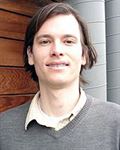
 The mass production of biofuels would be one of the greatest possible steps toward eliminating the world's dependence on fossil fuels, but a number of factors have stood in the way. Among them are arguments against using productive agricultural lands for fuel instead of food and the cutting of natural forests for the purpose of growing crops to turn into fuel.
The mass production of biofuels would be one of the greatest possible steps toward eliminating the world's dependence on fossil fuels, but a number of factors have stood in the way. Among them are arguments against using productive agricultural lands for fuel instead of food and the cutting of natural forests for the purpose of growing crops to turn into fuel.
That conundrum is at the heart of research being done by Elliott Campbell, a professor in the School of Engineering at the University of California, Merced. Campbell recently received the National Science Foundation's prestigious Faculty Early Career Development (CAREER) Award, through which he'll receive $407,588 over five years to study the capacity of abandoned agricultural lands to generate crops used to produce biofuels.
“Professor Campbell's research on the possibility of using abandoned agricultural lands for biofuel production will prove invaluable to the cause of sustainability, a core value this university was founded on,” said Samuel J. Traina, vice chancellor for research.
Campbell's project will begin with a study that will calculate the total area of abandoned agricultural lands in the United States and Brazil. He will then use field tests, historical crop figures and remote sensing data to estimate how much biofuel could be produced using these lands. Finally, he will determine the amount of greenhouse gasses emitted during the production and transportation of the biofuels to help determine the environment's net gain.
Projects like this one will help keep UC Merced at the forefront of a growing, global movement to create and develop renewable energy options and promote sustainability. And with the Obama administration recently announcing a plan to boost the production of biofuels in the United States, Campbell's research couldn't be more timely.
“Ambitious goals for bioenergy production have already been established by policy makers,” Campbell said. “Now it's up to the science and engineering community to discover how we can meet these goals.”
The study will analyze the potential production of several different biofuel applications — cellulosic ethanol, corn ethanol, sugar cane ethanol, dedicated biomass electricity facilities and biomass co-firing with coal — on these abandoned ag lands while also determining the most effective locations to limit the greenhouse gas emissions created in production.
“Biofuels hold great promise as a new energy source, but they must be produced wisely to avoid impacting our food economy, air quality and water resources,” Campbell said. “We know how to make biofuels, but we are still unclear on how to make biofuels without hurting our ability to grow food and protect natural resources. This NSF grant will allow us to simulate a wide range of biofuel options so we can determine the best way forward.”
Educational Opportunities
There is also a significant educational aspect to Campbell's work. He proposes to incorporate the Brazilian land use studies into the School of Engineering curriculum by way of a core requirement on sustainable energy, using an open-source online tool to allow students to exchange information with Latin American energy experts. Campbell hopes this will increase the diversity of students entering the field of sustainable energy.
Students would also apply their energy, land use and online knowledge to create a virtual tour focusing on the land use efficiency of UC Merced facilities. Campbell will use the online tour — which will be used as part of an outreach program aimed at K-12 students throughout the San Joaquin Valley — and online meetings to help further his goal of reducing greenhouse gas emissions related to his teaching and research activities.
“The green campus tour will help promote and encourage further investment in sustainable campus infrastructure that in turn provides a low carbon-intensity energy source for the research and teaching needs of my group,” Campbell said.






